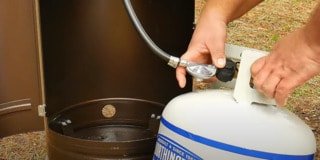Patio’s, Deck’s, and Gardens can have a significant price tag tied to them, and getting to spend more time outside enjoying your area makes sense. Many people add a propane-fueled heater to extend their useable time outdoors, but just…How long does a propane tank last on a patio heater?
The average outdoor propane-fueled heater has a BTU consumption of 42,300 BTUs. A full 20lb propane tank has 432,000 BTUs in it. The tanks BTUs divided by the heaters BTUs give you 10.21 hours of heat. It is an excellent practice to round-down for lighting and tank weight accuracy.
Check Out Our Cool Propane Tank Calculator
Hours of Heat Time
– Hours
Propane Cost per Hour
–
We have found several things that play at the mathematical answer, though. How many times you light it, how difficult it is to light, and if the tank actually has a full 20 pounds of propane in it. Read on to learn more details about how long a propane tank may last for you!
So, What Things Could Reduce My Heat Time on My Patio & Deck Heater?
We touched base already on the main reasons, however, we will get more detailed for you.
Tank Weight
For example, if you get your propane tanks filled by someone, are they weighing the tanks? If so, it should be over 20 pounds for the weight of the tank. Most fillers just fill the tank until it doesn’t fill anymore, which probably does give you somewhere between 15 to 20 pounds of propane.
Many people use tank exchanges, which generally only fill the tanks to 15 pounds. What? Yeah, but hopefully, they adjust the price to be cheaper?
Trying to Light
If you do not have a heater yet, you probably do have a gas grill? Sometimes that, puppy lights like a snap, and sometimes your like, is the piezo ignitor even sparking?
How full the tank is and the atmospheric conditions can play a role in how easy the heater is to light. For example, a little wind on a day when the tank is cold and only half-full will light different than a non-windy day, and the tank had some sunshine on it. The latter creates a little more pressure in the system. Even though there is a pressure regulator, it still has a range of operation.
Mechanical Condition
If your heater is new, the lines must expel the air. If it is older and had some heating experience, we’ll say the thermocouple could be corroded or dirty, making it hard to light or not stay on. Of course, this means you use up some propane trying to keep it running.

To learn more on how to clean or replace your thermocouple in your heater check out this article!
How Much Propane is Lost Trying to Light a Patio Heater
How much propane is lost depends significantly on your certain situations. However, on average, if you run your heater 3 hours at a time and have trouble lighting it once, maybe twice per tank, you should only lose about 0.50lb to 0.75 pounds of propane per tank getting it heated up.
How Much Does it Cost to Heat the Patio per Hour?
Check out the calculator above to help get your answers to your tank’s local cost in your area.
There are around 4.24 lbs per gallon of propane. Meaning, a full 20 lb tank holds 4.7 gallons of propane.
At the time of writing, the national average was about $3.65 per gallon of propane (when filling a tank). Which makes a 20 lb tank filling would cost around $17.22. Check out your prices locally; they may be different.
How Many Pounds of Propane is in Exchange Tanks?
We touched base on this earlier, but a 20lb exchanged propane tank usually has about 15 pounds of propane. This means that the cylinder or tank should cost approximately $12.91 for exchange.
I know I exchange my tanks because of the convenience and time constraints I seem to have. However, getting a good shape tank refilled is probably your best bet, but weigh it when you get home to see how much they are actually putting in there.
What if You Run the Heater at a Reduced Heat Setting? How Long Does It Last Then?
This seems straightforward, but manufacturers do not advertise the reduced heat setting BTUs generally. However, to explain it, we will convert the heat output into a percentage. If max is 100%, a lower setting would be..let’s say, 50%. Therefore, your BTUs are reduced by half as well, making your tank last twice as long.
We will note that an adjustment knob much under 50% will lose its effectiveness to radiate heat and fight the outdoors’ cold or chilling elements.
Can you Convert a Patio Heater to Natural Gas?
In short, yes. However, you lose the convenience of portability. Suppose you are someone that has a natural gas line in your yard. In that case, you can run a heater on natural gas by changing out the regulator, and depending on the manufacture, the orifice if not built into the regulator.
For safety’s sake, we recommend buying a patio heater that is natural gas to start with for the average homeowner.
Here is an excellent natural-gas-fueled outdoor heater for home or commercial use from Amazon. Click here to learn more about this natural gas outdoor heater.
Are the Other Options for Patio, Deck, and Garden Heaters?
There are actually 2 categories;…electric and gas. Gas can be broke-down into propane and natural gases.
There are advantages for each and to put our two cents to work here…
Electric patio heaters are best for stationary uses, such as in a gazebo or pavilion, or at least close to an outlet, so people do not trip over the cords and knock them over.
Natural gas is also restricted due to its supply line of natural gas. This should not be something lying on top of the ground.
Propane gas gives the most portability for open heating areas because they are an enclosed heat supply system.
To learn more about our choices on Electric patio, deck, and garden heaters, click here.
To learn more about our choices on Propane patio, deck, and garden heaters for outdoors, click here.


